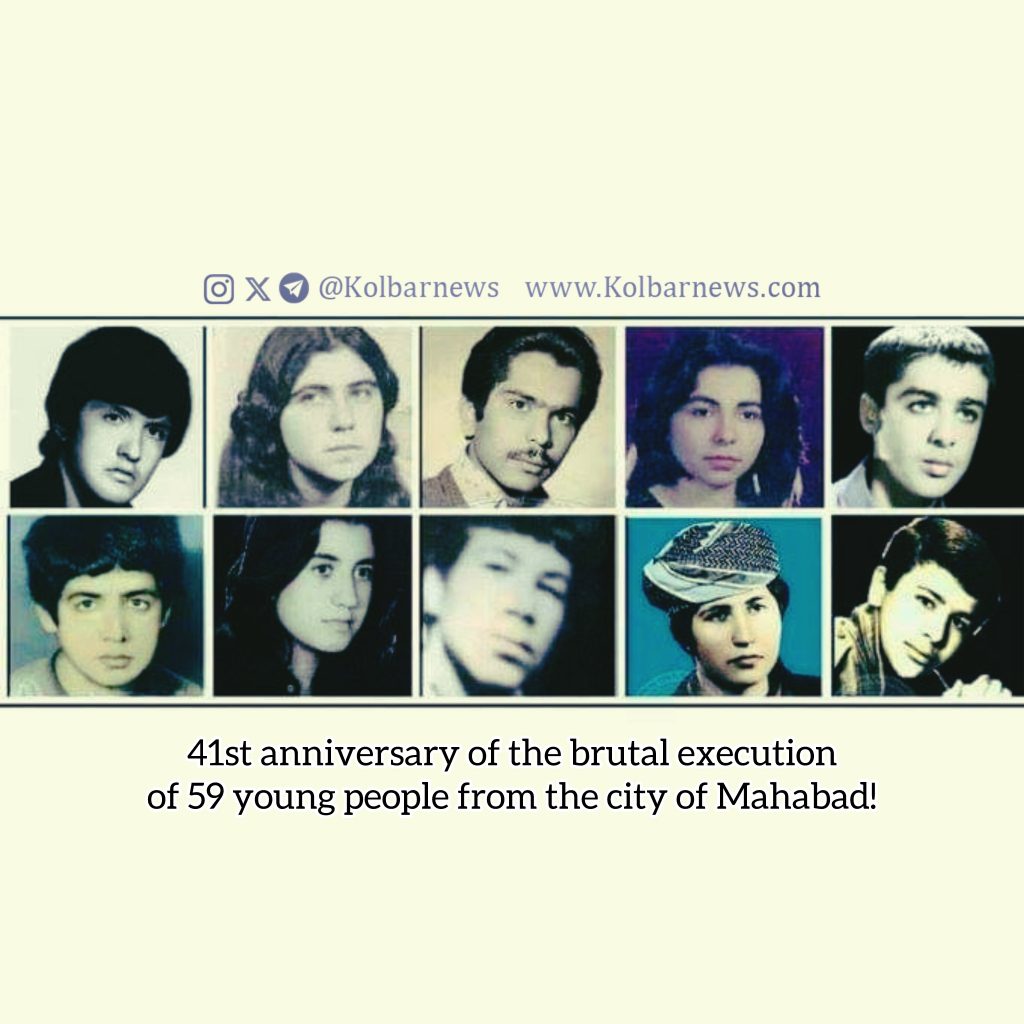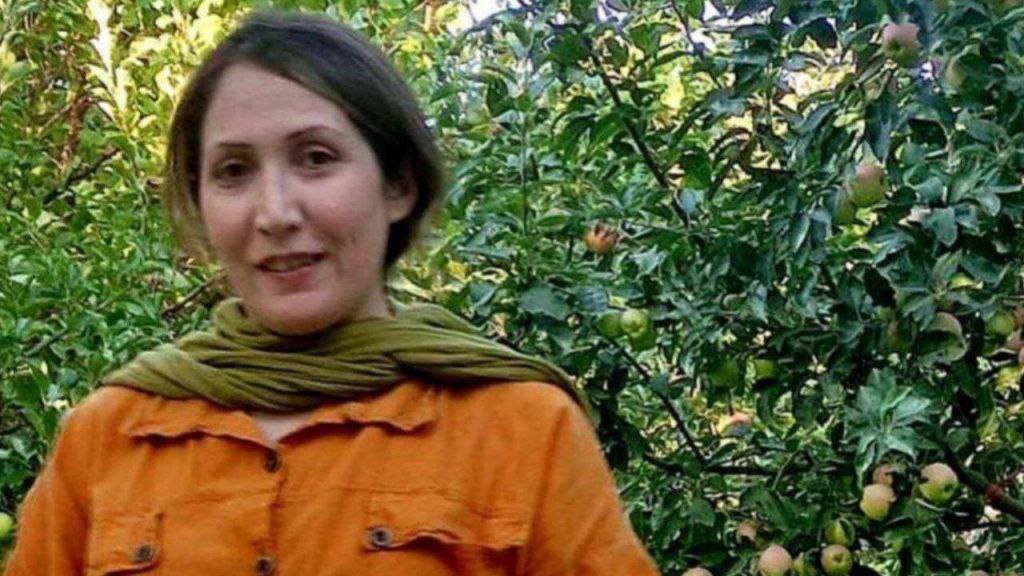
On June 1, 1983, revolutionary Kurdistan witnessed another of the countless crimes of the Islamic Republic regime. Forty-one years ago, on this day, 59 fighters and youths from the city of Mahabad were executed by the regime’s executioners and buried in unmarked graves. On June 1, 1983, the Islamic Republic regime, in an attempt to intimidate the people of Kurdistan and retaliate against the people of Mahabad, executed 59 young people from this city. Most of those executed had been randomly kidnapped from the streets of Mahabad in the months of April and May and taken hostage. Some of them were under 18 years old and a few were high school students in Mahabad.
On June 1, 1983, the people of Mahabad were confronted with an announcement issued by the local governor’s office, which had been distributed throughout the city. The announcement listed the names of the 59 executed individuals. The then-governor of Mahabad, Hamid Reza Jalaeipour, who later donned the mantle of a government reformist, had ordered the distribution of this announcement. Around this time, Mohammad Boroujerdi, the mastermind of the IRGC in the battlefront against the Peshmerga, had been killed. His death was of great significance to the regime, as he was the main commander of the IRGC operations in the western part of the country, directing all IRGC operations. His death elicited a severe reaction from all government officials. Prime Minister Mir-Hossein Mousavi fiercely attacked the Kurdish political groups, calling for maximum severity against the Kurdish parties, and issued a warning in this regard. Akbar Hashemi Rafsanjani also attacked the Kurdish parties and reiterated the threats. Mohsen Rafiqdoost, Minister of the IRGC, also spoke of revenge.
The regime, which had suffered severe blows in the battlefronts against the Peshmerga, decided to take revenge on the people of Kurdistan, especially the resilient people of Mahabad, by shedding the blood of young people who had been kidnapped and imprisoned without any evidence. Hamid Reza Jalaeipour, the governor of Mahabad, Mohammad Ebrahim Sanjaghi, the commander of Hamzeh Headquarters, Nateq Nouri, the Minister of the Interior, Hossein Sheikh-ol-Eslam, the then-governor of West Azerbaijan and an accused in the murder of Shapour Bakhtiar, Gholamreza Hassani, the Friday Imam of Urmia and the perpetrator of the Qarna and Qalat massacres, Seyyed Hossein Mousavi-Tabrizi, the Chief Justice, and Ali Sayad Shirazi, the commander of the Army Ground Forces, are among those listed as directly responsible for this crime.
These 59 detainees were transferred to the city of Tabriz and, in a brief court session, without any charges being proven against any of them, were condemned to death and handed over to execution squads. The families of these victims never learned where their loved ones were buried. This was neither the first nor the last time that the criminal Islamic Republic regime conducted mass executions in prisons, creating a bloodbath. These atrocities continued throughout the 1980s, reaching their peak in 1988, and have never ceased to this day.
The execution of 59 young people, planned as revenge against the people of Mahabad, was one of the most brutal examples. In response to this criminal act, on June 7, 1983, with the call of Komala, the Democratic Party of Iranian Kurdistan, and Mamosta Sheikh Ezzedin Hosseini, Kurdistan came to a complete standstill. This strike continued for several days in the city of Mahabad and was the first general strike executed with the coordination of the active political forces in Kurdistan and with the strong support of the people, setting a valuable precedent for similar actions in subsequent years.
The victims of the June 1, 1983 massacre were: Gholamreza Barzi, Hassan Jahanian, Ali Baneyan, Mohammad Ali Ali, Mohammad Amin Safa, Homayoun Nilouferi, Mahmoud Riazi, Mohammad Hosseini, Abbas Hosseinpour, Kazem Khatouni, Ali Mazneh, Abdollah Taheriyan, Rahman Rahimi, Ali Golparest, Mostafa Esmati, Khalagh Barzani, Yousef Eyazi, Kamal Chavashini, Hassan Rahmanian, Khaled Rahimi Azar, Khaled Safaei, Seyyed Ebrahim Ahmadi, Mohammad Masoudi, Mohammad Aboukari, Vafa Elyasi Mansour Janah, Mohammad Amin Ahmadi, Mohammad Salimi, Fereydoun Shangeh, Ali Bazyar, Khezr Rangin, Aboubakr Shokri, Mashallah Naderi, Hejar Karimi, Kamal Karimi, Karim Rahimian, Yousef Habib Panah, Mohammad Farouq Bazyar, Ebrahim Amini, Saleh Mam Ebrahimi, Shokri Naderi, Mostafa Faghri, Ali Ghovareh, Ali Salahi, Molla Hassan Lajvardi, Soleiman Hassanzadeh, Yousef Hassanzadeh, Karim Kaveh, Seyyed Mahmoud Seyyed Mahmoudi, Hamed Mahmoud Kandi, Hossein Kalahari, Abbas Yousufi, Siamak Saqzi, Ali Abadeh, Kamran Zahir Hojaji, Saleh Farhoudi, Maqsood Mahmoudi, Ahmad Karoobi, and Rahman Khezrpour.
On the anniversary of this heinous act, we honor the memory of the martyrs of this event and commend the resistance and endurance of their proud families.

